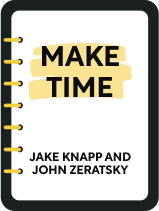

This article is an excerpt from the Shortform book guide to "Make Time" by Jake Knapp and John Zeratsky. Shortform has the world's best summaries and analyses of books you should be reading.
Like this article? Sign up for a free trial here .
Does your mind wander when trying to work? Is it difficult to concentrate?
Make Time by Jake Knapp and John Zeratsky is a guide to improving your concentration skills. If you can’t keep your focus on one task, then read their three tips that will help you.
Continue reading to learn how to stay focused on a task.
Staying Focused on a Task
As stated before, we spend most of our days reacting to a barrage of intrusions and demands: emails, phone calls, and notifications, not to mention other human beings encroaching on our time with action items, meetings, committees, and chores. Even when we squeeze in some time of our own, the siren call of social media, 24-hour news, and TV tricks us into frittering away the hours we otherwise might have spent pursuing some long-forgotten goal or dream.
Knapp and Zeratsky suggest that the most important step to reclaiming control and learning how to stay focused on a task is to choose one task to be your Focus each day. This won’t by any means be the only thing you do, but it’s the one thing you’ll prioritize over everything else. It might be a project you’ve been putting off at work, or it might be something you’ve always meant to do in your free time. Whatever you choose, it’s the thing you’ll look back on with a feeling of satisfaction, or even joy, at having accomplished.
What Is a “Daily Focus”?
Learning to determine an appropriate Focus is just as vital as maintaining your attention and using whatever tricks you can to keep yourself in the groove. According to the authors, your Focus will be a single task or project that will take 60-90 minutes to complete. Anything shorter may not be long enough for you to get fully immersed in your work, while anything longer risks wearing you out and impacting your energy for the rest of the day.
To be clear, your Focus doesn’t necessarily have to be related to your day job. It might be a project at home, something to benefit your family, or something done merely for pleasure or growth. The importance of choosing a Focus is that it lets you set your own priorities instead of responding to external demands. Also, be aware that your Focus doesn’t need to be set in stone; you can change it at any point throughout the day.
Your daily Focus can be anything you want, but Knapp and Zeratsky offer several ideas to help you decide where to dedicate your time.
- If there’s something important that’s under a time crunch, such as a project that has to be finalized, it might be an ideal Focus for your day. Deadline pressure is a great motivator.
- Is there something that will give you a feeling of pride? Perhaps you’ve been training to run a 5K, learning to paint, or playing in a band. Being able to look back with a feeling of accomplishment is a great way to determine where to aim your efforts.
Is there something you can do that will simply make you happy? Maybe there’s a novel you’ve been aching to read, a new recipe you’ve been wanting to try out, or a nature trail you’ve always meant to hike. Your Focus doesn’t have to be of value to anyone other than yourself. What’s important is that you use your time intentionally.
Now that you know what your Focus is, you’re ready to learn the three ways to stay focused on the task: maintaining your Focus, being mindful of your Focus, and being practical of your Focus.
1. Maintain Your Focus
Once you’ve selected a Focus for the day, the next step is maintaining your attention. If you need a deadline to get something done, Knapp and Zeratsky offer ideas for creating your own accountability. For example, tell a friend or family member what you’re hoping to accomplish and by when. Even if it’s only a self-imposed deadline, you’ll have linked it to the social pressure of someone else’s expectations.
If the Focus you’ve chosen seems overwhelming, break it down into smaller chunks. When working with smaller increments of time, the authors suggest using a timer as a cue to keep your attention on your task.
You can turn your daily Focus into a habit by associating it with some sort of cue. One particular trick that Knapp himself uses is to link a specific piece of music to your Focus.
2. Be Mindful of Your Focus
Once you’ve chosen your Focus and worked out how to motivate yourself to maintain it, you need to watch out for inner urges that may pull your attention away. For example, if you often feel distracted by questions you would normally look up on the internet, keep a notebook to write those questions down and look up the answers later. Or if it’s not uncommon to feel your mind wander, the authors point out that a short meditation may help recenter yourself and bring your attention back where you want it.
If you start to feel bored or stuck on your Focus, don’t feel bad about it, but don’t give in to the temptation of distraction. Sometimes it’s better to wait out your mental blocks and keep your mind in the zone.
When you feel too tired to tackle your Focus, even though you’ve set aside the time to do it, the authors suggest diving into it anyway. Sometimes merely starting to work on a project will spark creativity you didn’t know you had.
3. Be Practical About Your Focus
It may seem like the act of picking a daily Focus is just one more thing added to your already overburdened to-do list. In response, the authors offer several ideas to help stay focused on a task every day.
First, write your Focus down every day. It doesn’t have to be a new one; if you’re working on an extended project, you might repeat your Focus for as long as you have to.
Knapp and Zeratsky emphasize the importance of determining whether you function better in the morning, afternoon, or evening, and scheduling your Focus for that time. For some people, the early morning is when they’re able to concentrate best. For others, late at night is the only time when they’re able to eliminate distractions. The classic example is the “writer with a day job” who is only able to work on their own projects when the rest of their family is asleep.
If you feel like you’re lagging on a number of small projects, you can group them all into one big Focus: “getting caught up.” However, such activities are more reactive than proactive and not particularly motivating. Normally, you’ll want your Focus to be something to which you’re eager to give your full attention.

———End of Preview———
Like what you just read? Read the rest of the world's best book summary and analysis of Jake Knapp and John Zeratsky's "Make Time" at Shortform .
Here's what you'll find in our full Make Time summary :
- How the current landscape is designed to steal your time and attention
- How to be proactive to take back your time
- Why we were all better off as hunter-gatherers






